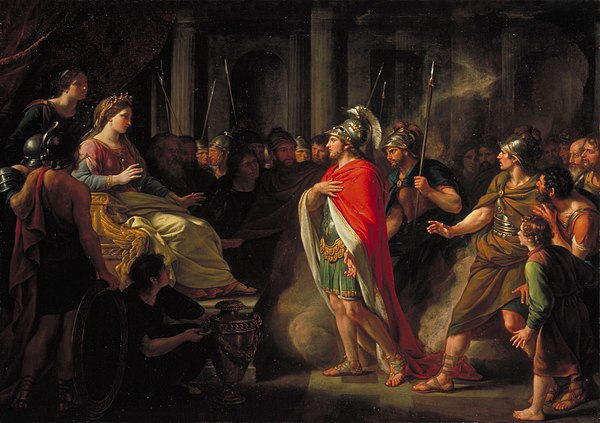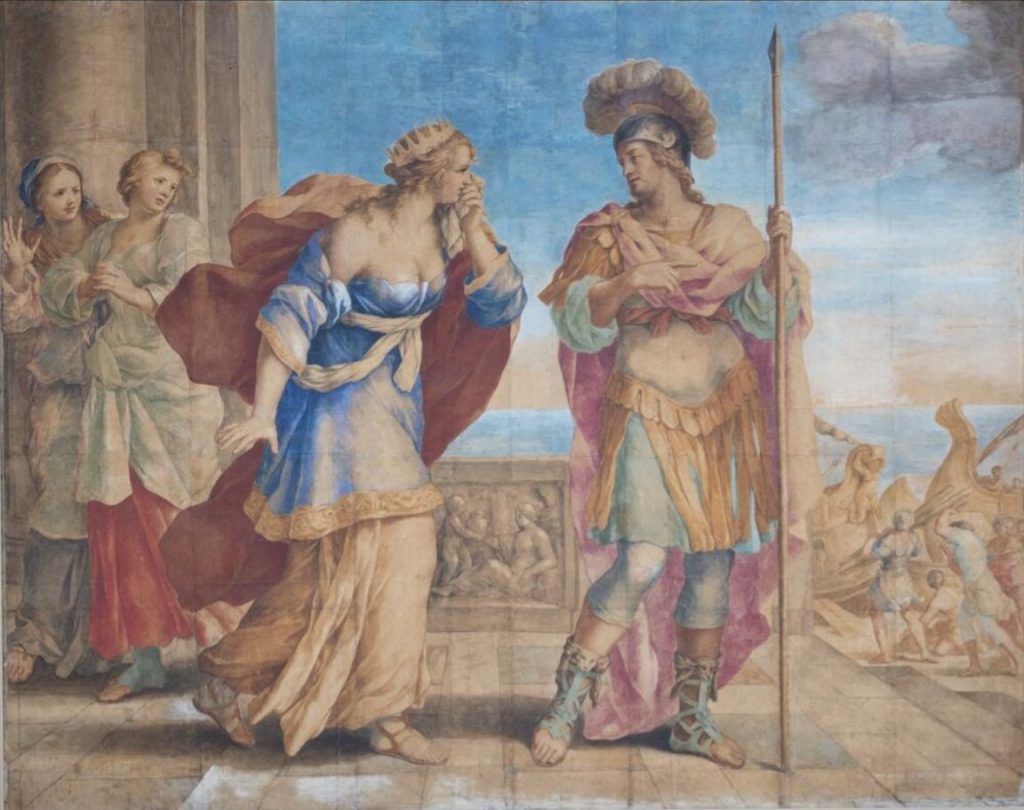Dido, Queen and founder of Carthage, was informed that a fleet of Trojan warriors had docked on her northern coast of Africa. Dido rushed to meet her new visitors and couldn’t help but be intrigued by the dashing Trojan warrior Aeneas, who led his followers to her doorstep. To get to better know her visitors, Dido threw a banquet where the Trojans would share the reasoning for their travels.1 Aeneas shared with Dido that Troy had fallen and he and his followers had escaped the city going up in flames. Dido became enamored in Aeneas’s story of the travels he had faced leading up to his arrival in Carthage. She couldn’t resist Aeneas’s charm and persuasive story-telling skills, and found he worked his way into a place in her heart.2

The feeling Dido had for Aeneas the night after their meeting made her go mad. After the passing of her husband Sychaeus years earlier, Dido had sworn never to love again. Her loyalty lied with him even when his body laid in the ground. Dido had passed up many suitors before. But what had made Aeneas different? Was it his handsome looks? Was it his bravery and accomplishments as a warrior?3 Perhaps Dido’s infatuation came from an outside supernatural source. That source would be the goddess Venus, Aeneas’s mother and protector. Venus wanted nothing more than for Aeneas to fulfill his destiny, which was to take his followers to Italy and found Rome. When Aeneas’s journey came to a halt in Carthage, Venus began to worry that the Carthaginians would kill the vulnerable Trojans. In order to ensure Dido’s men didn’t kill the future founder of Rome, Venus needed Dido to fall deeply in love with Aeneas, hoping the sheer intensity of Dido’s emotions would lead a hospitable welcome. Venus instructed Amor (the god of Love) to disguise himself as a baby on the night of the banquet. When Dido embraced the baby as she listened to the Trojan warrior’s stories, she was overwhelmed with love for Aeneas.4
Dido was unaware of the spell that Amor had put her under, so she confided in her sister Anna regarding the unwarranted feelings she had for Aeneas. Dido told Anna that she felt guilty that Aeneas had moved her in such a way that was similar to her first love Sychaeus. Anna replied to Dido with a wake up call. She felt that Dido was wasting her youth mourning over ashes that did not care if she moved on or not. Anna told Dido that the Trojan warrior was brought there by the goddess of childbirth, Juno, and questioned why she would try to fight the only love she had felt since the passing of her husband.5 Anna reminded her sister that Carthage was only half built and they faced the possibility of attacks from their surrounding forces at any moment. This threat of invasion has been on Dido’s mind before, and caused her and her sister to think that Juno brought Aeneas and the Trojan warriors there to join with their people and create the impenetrable Carthage of her dreams.6
Even though Anna’s speech provided Dido with temporary comfort, they found themselves going to the temples to every god’s alter to receive approval. After doing many sacrifices, Dido didn’t receive the answers she felt she needed. Feeling defeated, Dido wandered the city of Carthage in the dark and came upon Aeneas. She took him around her city, flaunting its walls and protection. Dido tried to muster up the courage to confess her feelings to Aeneas, but she was unable to get the words out. Wanting to prevent the night from ending, she asked him to retell his story of fleeing Troy. With the day becoming night, she started to fall asleep on a lounge, and Aeneas left her to her dreams.7
While the queen slept, Goddess Juno went to work to try and convince Venus to let Dido and Aeneas’s love story follow its natural course. She claimed that Venus’s distaste for Carthage shouldn’t last much longer, because Dido’s love for Aeneas could be the opportunity their people needed to unite for the better. Juno proposed a long lasting treaty to Venus; a contract of marriage between Dido and Aeneas that would unite the Trojans and Phoenicians for the two of them to rule over.8 However, Venus was reminded that it was Juno’s husband Jupiter (the god of the sky) who had come to her with Aeneas’s destiny. Venus didn’t share that information with Juno, and decided to entertain her plan for the fun of it.9 Venus requested that Juno get permission from Jupiter, because she didn’t think he would like the Trojans to take Carthage as their city. Juno agreed to get permission from her husband, but in the meantime she shared that their plan would need to be executed the next morning. Dido and Aeneas were to go hunting at the break of dawn, and while the hunters were busy, she would cause a storm to break out. When the two of them initially panic, Juno would lead them to a cave for shelter. Juno claimed that if Venus were truly on her side, she would meet them in the cave where Juno would bind the couple in marriage. Venus deceitfully nodded and smiled in return to Juno’s plan.10
When morning came, Dido adorned herself in her finest cloak, excited for the day ahead. Waiting outside her bedroom door were the Trojan leaders, but most importantly, Aeneas was there. As her escort, Aeneas joined his ranks with the Phoenicians. So far, Juno’s plan was going accordingly. A fierce storm broke out causing the escorts to scatter throughout the fields. Dido and Aeneas found themselves in the same cave. Mother Earth and Juno commenced the ceremony with flashes of lightning, and at their union, nymphs howled. Dido had no more reason to hide her love for Aeneas, and happily accepted that they were now married.11 News of the unification of Dido and Aeneas began to spread quickly across the city. However, this news was twisted with lies and rumors, and began to paint an awful image of the Queen Dido. The story being spread was that Dido had finally found a worthy lover, Aeneas, and that the couple had become blinded by luxury and sex, completely forgetting of their responsibilities to Carthage.12
Jupiter heard of the rumors circulating regarding the Trojan warrior through prayers from men at his alter. The prayers were concerned with the lavish life the couple had been observed to be indulging in. Their concerns were with Dido’s already small and irrelevant city, that it would now have this sissy of a man be their lord. Jupiter’s attention immediately went to the couple with disgust towards their marriage and lack of shame. He called for Mercury (the messenger of gods) to share with Aeneas that this side of him he was seeing was not the leader Venus had promised him. Jupiter questioned whether this man was worthy of being saved from the wrath of the Greeks twice, and if he would still be capable of creating the Roman Empire by war? He sent Mercury to ask Aeneas what his plan was and to command him to set sail for Italy.13
When Mercury arrived in Carthage, he came across Aeneas as he was building homes. With distaste, Mercury mocked Aeneas’s actions by claiming that his wife Dido probably loved him building foundations for her quaint city; meanwhile, he was forgetting about the destiny that awaits him. Mercury explained to Aeneas that the ruler of gods had sent him there to relay a message: “what will this overstay in Carthage bring you? If you do not desire anymore to carry this responsibility, think of your heir Ascanius who is owed the Roman Empire on Italian soil.” When Mercury left, Aeneas was stunned with hair standing up and unable to speak.14 Aeneas’s immediate reaction was that he must leave the city he had grown fond of, but he knew founding his future empire was his destiny. He felt saddened that he would have to leave Dido, the woman he loved. But what was he to do? The gods had chosen him, and he battled with the idea of giving it all up. He came to the conclusion that he had to give up his love and life in Carthage for something much bigger than himself. After he came to that decision, Aeneas became concerned with how Dido would take the news. He wondered whether Dido would think his feelings for her were surface level and not genuine, when if fact, his feelings were genuine, with the exception that he felt that Dido had taken their relationship more seriously than he had. He never agreed to the long-term obligations she had imposed on him with marriage, but he failed to ever mention these feelings to Dido previously. In the interest to avoid facing Dido, he rounded up his men and ordered them to prepare for their departure quietly. He hoped that Dido’s love for him would blind her from sensing his tricks.15
Fooling a lover would be much harder than Aeneas thought. Dido grew suspicious almost immediately, and only had her worst fears confirmed when she heard rumors of the Trojan fleet preparing to set sail. Overcome by betrayal and rage, Dido rushed through the city to find Aeneas. When Dido met him, she called him a “criminal,” and was shocked that he would even believe he could get away with deceiving her. She asked him why he was so desperate to leave her, or even taking the risk to sail in a storm-filled ocean? Full of tears and a belief that he was her one true soulmate, Dido begged Aeneas to change his mind. She expressed to him that her sacrifices for their relationship had caused her own people to hate her, and her reputation to be ruined. Dido pleaded for him to at least leave her with a child to remind her of him, or else she would have nothing left to live for.16 She struggled to accept the consequences for the passion that she once worked so hard to resist when she first met Aeneas. She was willing to forgive him for this moment of betrayal if he changed his mind. A child would’ve made her feel as though their relationship wasn’t meaningless and empty. Dido had sacrificed so much for this love and Aeneas has given her nothing; not even a child.17 Aeneas was unable to look Dido in the eyes while he shared with her that he accepted her feelings towards him and that he’d never forget her. His explanation to her was that he never agreed to the marriage by contract, and if he was truly in charge of his own free-will, he would have stayed in Troy, never having the opportunity to meet her. The gods chose his path for him. When he saw visions of his future son, he felt that staying in Carthage would be selfish. Dido looked Aeneas up and down with disbelief that he had come from a goddess, and called him a “liar.”18

Dido condemned herself once more to Aeneas. She was mad at herself for taking someone in who couldn’t be trusted and even risked sharing her kingdom with him. Once she was done expressing her self-pity, as a scorned lover, she resulted to threats of revenge. She warned him that she would commit suicide and her ghost would haunt him and his people after death, assuring him that not even the gods would be able to protect him.19 Dido fled his presence at once, leaving Aeneas speechless. Nevertheless, he followed his commands from the gods and Aeneas returned to his ship lovesick, while his men continued to prepare for their departure.20
Back at the palace, Dido was consoled by her sister Anna. With one last effort to plead her case for Aeneas to stay, Dido asked her sister to go to the Trojan ships on her behalf. Dido believed Aeneas had a special soft spot for Anna. She wanted her sister to reason with Aeneas and only ask him not to leave on that day, where the weather would not be kind to his ships. She begged only for more time with him and was willing to forget about their marriage. Anna was to tell him that if he granted her sister’s final wishes, she would repay him after her death, forgetting all about her threats of revenge. Anna, being the good sister she was, went to the ships and did exactly as her sister asked. However, Aeneas had grown numb to their tears and pleas. He told Anna he would be continuing with his journey and that he felt Dido’s tears were only in vain.21
When Dido saw that her last-ditch effort was not successful, she began to plan her suicide. She wanted to die, yet she also wanted to make sure that death was the only option left for her. She came up with reasons for her to live, but found the act of suicide victorious over any other options she presented herself with. Dido was plagued with an overwhelming feeling of loneliness. Death offered her the ability to be reunited with her first love, Sychaeus. Dido was also challenged with a feeling of deep guilt on one hand, and on the other hand a deep sense of feeling wronged by Aeneas. She felt that she deserved to die, and death gave her the means for revenge. Her suicide would curse the future Trojan generations. Throughout that process of justification, suicide became more and more desirable.22
Dido came to the conclusion that she would commit suicide; however, she kept this information to herself. Calling to Anna, she expressed that she had found way to bring Aeneas back, or to rid her feelings for him once and for all. Dido’s fake plan was that she found a priestess whose spells could ease the mind of whoever she wished, spells so powerful that could’ve caused rivers to stop moving. As a part of her plan, Dido told Anna that the priestess required a secret pyre to be built in the palace. On top of it, they needed to stack all of the belonging that Aeneas had left behind for the ritual to work. Unaware that she would be building her sister’s funeral, Anna did as she was told.23 Once the pyre was built, Dido climbed up with all of Aeneas’s belongings and called out to the gods who saw and punished broken bonds of love. The darkness of the night became deeper and all living things slept, yet the Phoenician Queen’s heart continued to hound her with questions. What was she to do? Stay in Carthage and be laughed at for the fool she was? Follow the Trojans in hopes they remembered the hospitality she once showed them? Her prayers led her to the same answer: die.24

Aeneas slept peacefully in his ship, feeling confident his fleet would be ready to depart in the morning. Suddenly, Mercury visited him in his dream warning him again that he needed to leave Carthage immediately, but this time, with a tone of urgency. Aeneas wasted no time and ordered his fleets to start moving. When dawn came, Dido was shocked to see the Trojan ships had already set sail with Aeneas to0 far to be reached.25 In a frenzy, she regretted not doing more as the queen. She felt she could have killed his men, burned down their ships, anything would’ve been better than what she had done. She called to the gods that if that was the way things must have been, then they should let Aeneas struggle for the land he desired in war. She wanted him to lose his son and have his men slaughtered in front of his own eyes. If his land ever reached peace, she wanted him to be executed, so he never got the chance to enjoy his land as ruler. Dido declared these her last prayers before her death:
“This I implore, this is my last cry, as my last blood flows. Then, O my Tyrians, besiege with hate his progeny and all his race to come: Make this your offering to my dust. No love, no pact must be between our peoples. No, but rise up from my bones, avenging spirit! Harry with fire and sword the Dardan countrymen now, or hereafter, at whatever time the strength will be afforded. Coast with coast in conflict, I implore, and sea with sea, and arms with arms: may they contend in war, themselves and all the children of their children!”26
The Phoenicians would never be at peace with the Trojans. For all the future generations their people would be at war.27 Following Dido’s prayers, she requested her husband’s old nurse to get her sister Anna, and inform her to get the offerings to finish the ritual. The nurse went on her way, and Dido began to franticly execute her real plan. She climbed on top of the pyre and drew Aeneas’s sword. She called to the gods once again and blamed them for ever bringing the Trojan ships to her shores. Dido declared that she liked the dark path she had chosen and for the omen of her death would follow Aeneas. Quickly she fell on the Trojan’s sword.28
News of Dido’s death spread quickly throughout the city. Anna came running in, terrified by what her sister had done. Pushing past the crowds of people, Anna called out to her sister full of grief and regret, “Was this your plan Dido? To deceive your own sister and leave me here alone? We should have died together, on the same sword. But no, you have destroyed yourself and me too. If you still have any breath, let me catch it.” Anna pushed her way up to the pyre and held her dying sister in her arms. Dido’s eyes struggled to open and her body began to become lifeless. She breathed her last breath in her sister’s arms. Feeling pity for Dido’s hard life and even harder death, Juno sent her messenger Iris down to Carthage. Iris held Dido’s head and accepted her sacred offering, then proceeded to release her soul from her body.29

- Kenneth Quinn, “The Fourth Book of the ‘Aeneid’: A Critical Description,” Greece & Rome Vol. 12, No. 1 (1965): 18. ↵
- Ingo Gildenhard, “Commentary,” in Virgil, Aeneid, 4.1–299, 1st ed., vol. 2, Latin Text, Study Questions, Commentary and Interpretative Essays (Open Book Publishers, 2012), 40. ↵
- T. R. Bryce, “The Dido-Aeneas Relationship: A Re-Examination,” The Classical World 67, no. 5 (1974): 258. ↵
- Virgil, and Ian Ganassi. “Aeneid, Book 4.” New England Review (1990-) 2005. 26 (2): 29. ↵
- SARAH RUDEN, “BOOK 4,” in The Aeneid (Yale University Press, 2008), 71. ↵
- T. R. Bryce, “The Dido-Aeneas Relationship: A Re-Examination,” The Classical World 67, no. 5 (1974): 260. ↵
- Virgil, and Ian Ganassi, “Aeneid, Book 4,” New England Review (1990-) 2005. 26 (2): 31. ↵
- SARAH RUDEN, “BOOK 4,” in The Aeneid (Yale University Press, 2008), 73. ↵
- Kenneth Quinn, “The Fourth Book of the ‘Aeneid’: A Critical Description,” (Greece & Rome Vol. 12, No. 1, 1965), 19. ↵
- Virgil, and Ian Ganassi, “Aeneid, Book 4,” New England Review (1990-) 2005. 26 (2): 32. ↵
- SARAH RUDEN, “BOOK 4,” in The Aeneid (Yale University Press, 2008), 74-75. ↵
- Virgil, and Ian Ganassi, “Aeneid, Book 4,” New England Review (1990-) 2005. 26 (2): 34. ↵
- Virgil, and Ian Ganassi, “Aeneid, Book 4,” New England Review (1990-) 2005. 26 (2): 35. ↵
- SARAH RUDEN, “BOOK 4,” in The Aeneid (Yale University Press, 2008), 78. ↵
- T. R. Bryce, “The Dido-Aeneas Relationship: A Re-Examination,” The Classical World 67, no. 5 (1974): 262. ↵
- Virgil, and Ian Ganassi, “Aeneid, Book 4,” New England Review (1990-) 2005. 26 (2): 38. ↵
- T. R. Bryce, “The Dido-Aeneas Relationship: A Re-Examination,” The Classical World 67, no. 5 (1974): 264. ↵
- Virgil, and Ian Ganassi, “Aeneid, Book 4,” New England Review (1990-) 2005. 26 (2): 38-39. ↵
- Kenneth Quinn, “The Fourth Book of the ‘Aeneid’: A Critical Description,” (Greece & Rome Vol. 12, No. 1, 1965), 22. ↵
- SARAH RUDEN, “BOOK 4,” in The Aeneid (Yale University Press, 2008), 81. ↵
- Virgil, and Ian Ganassi, “Aeneid, Book 4,” New England Review (1990-) 2005. 26 (2): 40-41. ↵
- T. R. Bryce, “The Dido-Aeneas Relationship: A Re-Examination,” The Classical World 67, no. 5 (1974): 267-268. ↵
- Virgil, and Ian Ganassi, “Aeneid, Book 4,” New England Review (1990-) 2005. 26 (2): 42. ↵
- SARAH RUDEN, “BOOK 4,” in The Aeneid (Yale University Press, 2008), 85-86. ↵
- Kenneth Quinn, “The Fourth Book of the ‘Aeneid’: A Critical Description,” (Greece & Rome Vol. 12, No. 1, 1965), 24. ↵
- Virgil, Aeneid, Book IV, lines 863-875, trans. Robert Fitzgerald (New York: Vintage Classics Edition, 1990), 118-119. ↵
- Virgil, and Ian Ganassi, “Aeneid, Book 4,” New England Review (1990-) 2005. 26 (2): 45-46. ↵
- SARAH RUDEN, “BOOK 4,” in The Aeneid (Yale University Press, 2008), 88-89. ↵
- Virgil, and Ian Ganassi, “Aeneid, Book 4,” New England Review (1990-) 2005. 26 (2): 47–48. ↵



21 comments
Lorena Maldonado
I love this article and its storytelling. It is so heartbreaking and well written. I also think this article was very interesting and paid close attention to detail as well as making sure you got to know the characters well. You understand where the characters were coming from and what they were feeling without being forced to understand them. This story moved so nicely and was very easy to understand and read. I really enjoyed it and think it was most certainly deserving of this nomination.
Shecid Sanchez
First I want to say congratulations on being nominated for an award! I have never heard the story the story of Aeneas and Dido so it was definitely a very interesting story to read. I just want to say that this article was probably the most detailed article I’ve read this semester! I hated how Aeneas left Dido the woman he loved for the founding of Rome.
Mateo Ortega-Rios
Congratulations on your article getting published! Also, this article was a very fun read and I enjoyed every second of it. A very down to every detail article that drew my attention from the start. I have never heard of this story but it is one ttat I really enjoyed reading.
Ana Barrientos
This article was incredible… I loved reading it. Your title caught my eye and once I started reading it, I couldn’t stop. It was well written and well researched, I like how you told the story. I don’t know much about mythology but after reading the article I feel like I learned so much. Overall, amazing job! Congrats on your nomination!
Dylan Vargas
I like this article and its story. It’s very descriptive and explanatory and gives us a full view of everything that went down. Giving us tons of sources that are relevant to the topic and also at the point that it is needed. It’s very long but is needed to tell the story. The story of the Queen and her revenge was something that I never knew and I am glad that I read this.
Courtney Mcclellan
I really enjoyed this article. I have always been a big fan of mythology and the stories of old and this article highlights everything i love about the stories.It’s always nice to learn about different stories that aren’t as popular.Your article is filled with detail and it is amazing. Congratulations on your nomination.Great job bringing new details and stories to life.
Sudura Zakir
Mind-blowing context of this article although I know this story but the writing was extraordinary. I liked reading the whole article because of its detail illustration of the topic of what happened. The author made the article more lively and amusing for the readers. The pictures were more artistic and fabulous. Great work!!!!! Congrats on getting published and nominated. I have learned about the detailed story from this article.
Vanessa Preciado
Wow ! This was definitely a piece to read. I have never heard of this story before. But it is very interesting. This article had me interested the whole time. I was hoping at the aeneas would here of didos death, he did cause her a lot of pain and confusion. Roman mythology is very entertaining. Great work! The images used in this article brought the story to life.
Sophia Phelan
So much research went into this! It was really fun to read.
Emily Rodriguez
Wow! This is such a detailed article, a nomination rightfully received. You really showed your capability of research and dug deep into your topic to provide the reader with a great storyline. I had never heard of this story, but it was such a great read. You also did a great job at finding images to go along with your story that related to what you were saying. Great job and congratulations on your nomination.